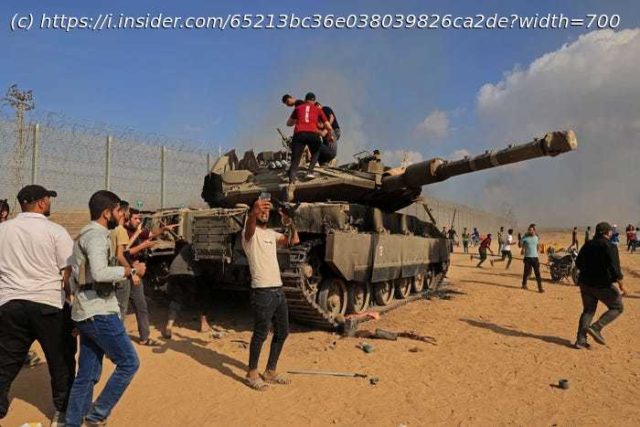Israelis tell Insider why their battle with Hamas has invoked echoes of America’s September 11, 2001, attacks, and how they’re dealing with the fear of loved ones presumed kidnapped or killed.
Reut Aisenberg woke with a start on Saturday morning to the sound of air raid sirens slicing through the otherwise tranquil Tel Aviv air.
At about 6 a.m., Aisenberg, 36, scrambled into the reinforced concrete safe room inside the flat she shares with her 40-year-old husband and their two young children. Together, in their pajamas, they huddled in the darkness as the first of thousands of missiles rained down over their city, the opening act of a brazen strike by Hamas that some in Israel are calling the country’s “9/11 moment.”
It was far from how the family thought the day would unfold, having planned to mark the annual Simchat Torah holiday at a local park.
The timing of the attack on Saturday morning “was a shock,” Aisenberg told Insider on Sunday night from her home. “No one saw it coming,” she said, adding: “This is going to be a trauma that Israel is going to carry with it from now until the end of time.”
“It’s a very small country and everybody knows someone who is either in the military or someone who lives in one of those communities that were hijacked by terrorists,” Aisenberg said.
Within Israel’s borders, where the clash has already claimed more than 700 lives, people have begun drawing parallels between the onslaught and the September 11, 2001, attacks on the United States.
Multiple Israelis spoke to Insider throughout the weekend about what they’d witnessed and the attack’s impact, which they say will long burn in their nation’s collective memory.’You have rockets raining from the sky’
Like 9/11, which changed the United States and its identity for years to come — remaking its national security and intelligence-gathering apparatus, triggering a protracted military campaign in the Middle East, and fueling a sense of patriotism unseen in years — Aisenberg and others agreed that the events of the past 48 hours would also fundamentally reshape Israel from cultural, security, and political perspectives.
Despite the long-term ramifications, for now, Aisenberg is just hoping to ride out the conflict wherever it leads. She feels relatively secure in Tel Aviv since the sirens typically provide about 60 seconds’ worth of warning before the impact of incoming missiles from Gaza.
Compared to the 15 seconds she previously had while serving as a member of the Israeli armed forces in Sderot, a city close to the Gaza border, a full minute feels like a relative luxury — ample time to seek shelter in a stairwell or another location before an explosion.
With 15 seconds, the only option is to run into someone’s house if the door is open, she said, or lay on the ground and “pray to God” that you don’t die.
“I’m not freaking out. I’m still in control,” Aisenberg said. “I can make decisions, I can function. But clearly, it’s not easy. You have rockets raining from the sky.”
Although Israelis are both “shocked” and “very sad,” she said they are resolved not to give in. “We are going to win this.”Historical parallels
Israel is not a country unaccustomed to violent clashes with its neighbors.
But the scale of these attacks — which saw Hamas fighters take hostages back over the Gaza border and mount offensives across the land, sea, and air from motorized paragliders — are of a different magnitude than the country has witnessed before.
Home
United States
USA — mix 'This is Israel's 9/11': Why Israelis say Hamas' unprecedented assault will change...






